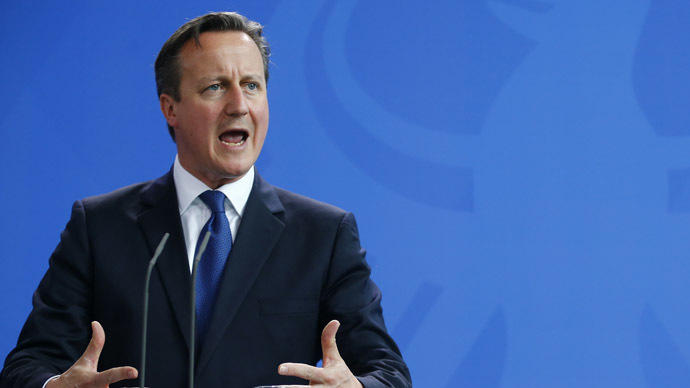‘It’s fantasy to believe that Cameron will fundamentally change EU’

All that Prime Minister David Cameron is going to achieve in his talks with EU officials on the UK’s membership is a few cosmetic changes, Robert Oulds, the chair of the Eurosceptic Bruges Group, told RT.
Cameron will present these minor changes as a great negotiating success, Oulds told RT.
RT:As the British prime minister pushes for a new deal for his country to remain in the EU, some top European officials seem to be finally warming to the move. The French Finance Minister has said the idea of a so-called “two-speed Europe” could be acceptable now, as a means of keeping the bloc together. Are we seeing a concerted effort by Europe to keep the UK in the EU?
Richard Williams, of the Institute of Economic Affairs, on a possible Brexit: “They [the EU] are pretty desperate for the UK to remain in the EU, and it’s partly about money – the UK is the second largest contributor to the EU budget after Germany.”
READ MORE: Cameron refuses to rule out ‘nuclear option’ of EU Brexit over human rights reform
Robert Oulds: They certainly want to keep Britain in the EU, where of course Britain is still going to be subject to EU rules and under the supremacy of EU decision-making, while they have their own elected officials still going to be dictated to by the EU. And they certainly want that situation to continue. All that David Cameron is going to achieve is a few cosmetic changes, he is going to laud them as a great success, but he’s not going to fundamentally change the nature of the EU. That’s really a fantasy. And he is not really going to bring back substantial powers. He is going to make few cosmetic tweaks to the terms of membership and then present it as a great negotiating success. He’s done similar things before. Britain has been fooled before in 1975 when there was last referendum on this topic. There was a phony renegotiation and of course some minor changes made and it encouraged people to vote to stay in the EU. And that’s why David Cameron talks about reform because he knows that the middle-way alternative is the most likely to win a referendum so he can pretend that the terms of EU membership have changed, he knows according to opinion polls most people will back that. So really his whole renegotiation – it’s a device, it’s a strategy to keep us in the EU.
RT:What about Eurosceptic sentiments? Are they growing?
RO: Of course, it’s a big issue of immigration, that’s not going to go away, that will remain the issue. But it’s not really the fundamental issue. The fundamental question about staying in the EU or not is really about who governs Britain. Is it going to be people we elect or dismiss at elections, people who are accountable to us, or is it about being responsible to an unaccountable elite based in Brussels who can dictate largely issues of policy that effect every single person within the UK? Who governs Britain? It’s a sovereignty angle. Is Britain going to be an effective democracy, an independent state? And that can only be done if we’re outside of the EU. So that’s the fundamental question we need to look at: Is Britain going to be free of the EU where we make our own rules and make our own decisions by people we can elect and dismiss at elections, rather than being told what to do by the EU and its unaccountable and unelected elites.
Richard Williams, of the Institute of Economic Affairs, on the UK’s role in the EU: “There are also elements in the EU... like Britain’s contribution to the policy of debates: it tends to be more liberal on economic issues, creates an alliance of northwestern European countries, it is the link to the US, there is also the geopolitical element there.”
READ MORE: Cameron playing ‘dangerous’ game on EU referendum, says France
RT:What about Greece? Will the European Union let it go easily, if the country decides to leave it?
RO: Ultimately, Greece will have to come out of the EU. They are certainly not letting it go easily, they are bullying Greece, they are trying to dictate their whole economic policies, they are taking over Greek assets, their bailouts are really just a way of transferring private debts onto public books. The Greek economy can’t actually move forwards until it’s out of the Euro. Anything that they do, any policy reforms, are just sticking plasters and a few market labor reforms and pension reforms are not going to transform the Greek economy to a position where they can deal with the debts. The only way is for Greece to say it cannot repay its enormous debts which have grown as a result of the austerity program. It cannot repay its enormous debt until it’s outside of the Euro, and gets its economy growing again and deflates its way out of the crisis that it’s been in since 2009.
Richard Williams, of the Institute of Economic Affairs, on a possible Brexit: “If the British government had free markets they could get rid of a lot of hugely costly EU regulation, get rid of the common agricultural policy that makes food prices ridiculously expensive in Britain, and start to trade more freely with some of these emerging economies: China, Russia, Brazil, and so on.”
The statements, views and opinions expressed in this column are solely those of the author and do not necessarily represent those of RT.
The statements, views and opinions expressed in this column are solely those of the author and do not necessarily represent those of RT.












